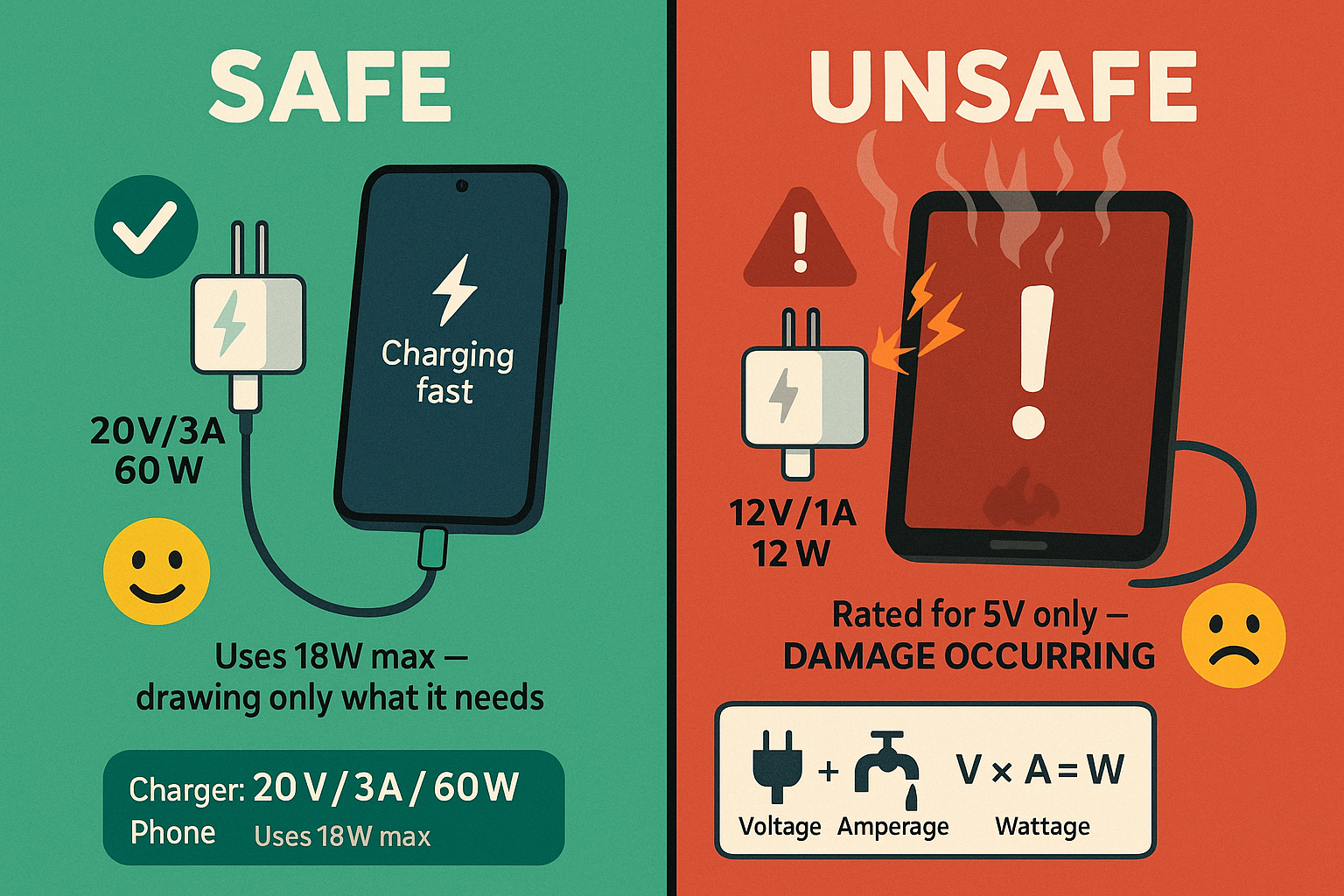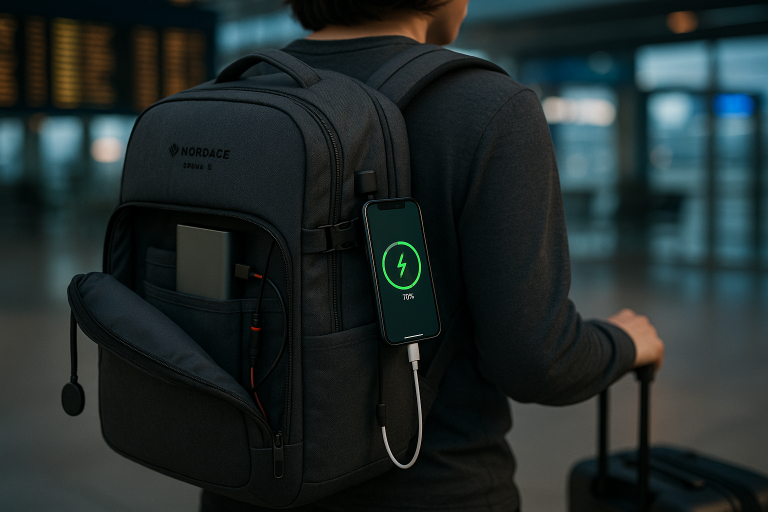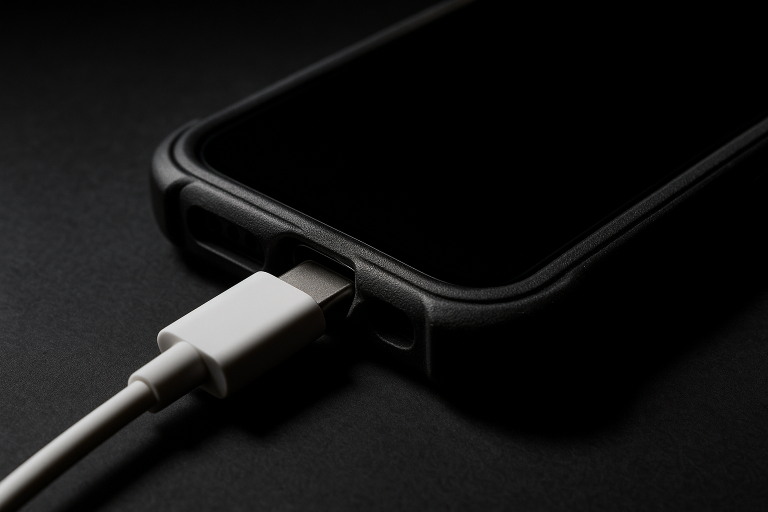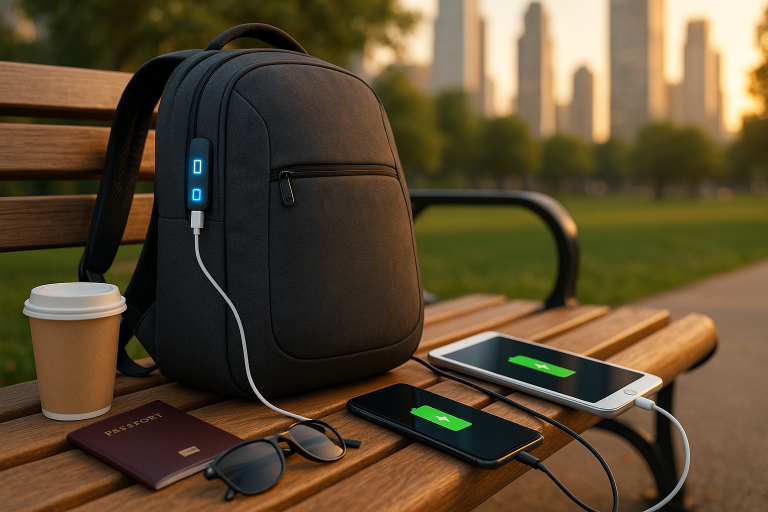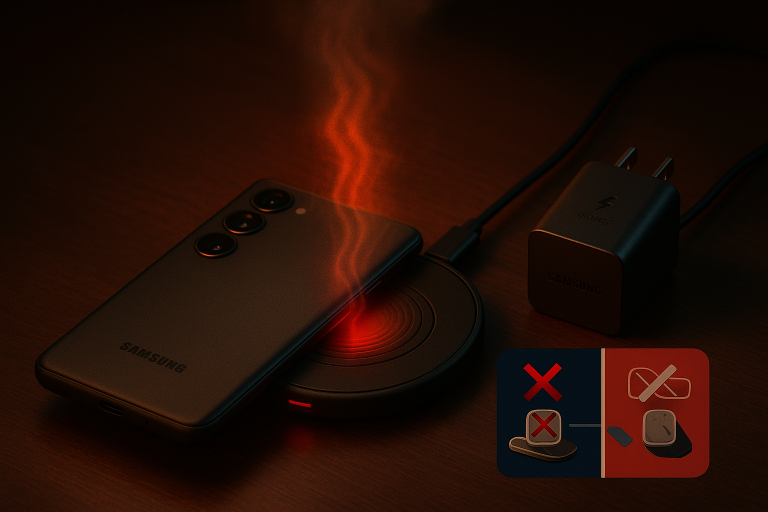Can I Use a Higher-wattage Charger for My Device?
If you’ve ever lost or damaged your device’s original charger, you’ve probably wondered: Can I safely use another charger instead? Specifically, is it safe to use a higher-wattage charger than what came with my phone, tablet, or laptop?
This question is more relevant than ever in our multi-device world. With so many chargers on the market—ranging from 5W to over 100W—it’s essential to understand how wattage works and whether using a different charger could harm your electronics.
In this definitive guide, we’ll cover everything you need to know about:
- What wattage means
- Whether higher-wattage chargers are safe
- How devices regulate power
- The risks and benefits
- How to choose the right charger
- Real-world examples and best practices
Let’s dive in.
Recommended: Top Charging Accessories for Fast and Safe Power Delivery
| Product | Description | Amazon Link |
|---|---|---|
| Anker 100W USB-C Charger (GaN) | Universal high-wattage charger, safe and efficient | View on Amazon |
| USB-C Power Meter Tester | For checking actual wattage during charging | View on Amazon |
| Cable Matters USB-C to USB-C Charging Cable (100W) | 5A fast charging cable, supports full 100W | View on Amazon |
What is Wattage?
Wattage (W) is a unit of electrical power that measures how much energy a device uses or how much a charger can supply. In the context of charging, wattage tells you how quickly a charger can deliver energy to your device.
You can calculate wattage using this simple formula:
Watts=Volts×Amps
Example:
- A 5V/2A charger delivers 10 watts
- A 20V/3A charger delivers 60 watts
While higher wattage generally means faster charging, the actual speed depends on what your device is capable of drawing—not just the charger itself.
Voltage vs. Amperage vs. Wattage – What’s the Difference?
Understanding these three terms will help you make better decisions when choosing a charger.
| Term | Meaning | Analogy |
|---|---|---|
| Voltage (V) | Electrical pressure | Water pressure in a pipe |
| Current (A) | Flow rate of electricity | Amount of water flowing through the pipe |
| Wattage (W) | Total power delivered | Total volume of water coming out |
💡 Key Takeaway:
Your device determines how much voltage and current it draws. A higher-wattage charger doesn’t force extra power into your device unless there’s a mismatch in voltage.
Can You Use a Higher-Wattage Charger?
Yes, in most cases, you can safely use a higher-wattage charger with your device. Modern smartphones, tablets, and laptops have built-in circuitry that regulates how much power they draw.
So if your phone needs 18W and you plug it into a 30W charger, it will still only draw 18W. However, if both your device and charger support fast-charging protocols, the phone may actually charge faster.
Benefits of Using a Higher-Wattage Charger
Here are some of the advantages of using a higher-wattage charger:
1. Faster Charging (When Compatible)
If your device supports fast charging (e.g., USB Power Delivery), a higher-wattage charger can significantly reduce charging time.
2. Multi-Device Compatibility
High-wattage USB-C chargers often support multiple output ports and can charge phones, tablets, and even laptops—all with one brick.
3. Future-Proofing
Buying a 65W or 100W USB-C charger ensures compatibility with future devices that might demand more power.
4. Reduced Clutter
One powerful charger can replace multiple smaller ones, simplifying travel and workspace setups.

Risks of Using a Higher-Wattage Charger
While higher-wattage chargers are generally safe, here are some potential downsides:
1. Overheating
Using a poorly made or incompatible charger can cause overheating. Always ensure the voltage matches your device’s requirements.
2. Battery Degradation
Frequent fast charging—even with compatible chargers—can accelerate battery wear over time. Lithium-ion batteries perform best under moderate conditions.
3. Incompatibility Issues
Older or budget devices may not recognize high-wattage chargers or may behave unpredictably when connected.
4. Safety Hazards
Counterfeit or uncertified chargers can pose fire or electric shock risks, especially if they’re low quality or mismatched.
Pros and Cons Summary
| Pros | Cons |
|---|---|
| Faster charging (if supported) | Risk of overheating with poor-quality chargers |
| Future-proof and versatile | Potential battery degradation over time |
| Less clutter with fewer chargers | Possible incompatibility issues |
| One charger for multiple devices | Safety concerns with fake or low-quality products |
Understanding Charging Protocols
Chargers don’t just deliver raw power—they negotiate with your device to determine how much power to send. This negotiation is handled by charging protocols.
Common Fast-Charging Standards:
| Protocol | Used By | Max Wattage |
|---|---|---|
| USB Power Delivery (USB-PD) | Apple, Google, Samsung, Dell | Up to 240W |
| Qualcomm Quick Charge (QC) | Android devices | Up to 100W |
| Apple Fast Charging | iPhones, iPads | Up to 20–27W |
| Samsung Adaptive Fast Charging | Galaxy phones | Up to 45W |
| Proprietary (e.g., OPPO VOOC) | Specific brands | Up to 150W |
Important Tip:
For optimal performance, both your charger and device should support the same protocol. Otherwise, the device will default to standard charging speeds.
Device-Specific Guidance
Here’s a breakdown of common devices and their charging needs:
Smartphones
- iPhone 14/15: Supports up to 20–27W (use USB-PD)
- Samsung Galaxy S23 Ultra: Supports up to 45W (uses USB-PD or proprietary fast charge)
- Google Pixel 7: Supports up to 30W (USB-PD)
Safe Swap: iPhone with iPad charger (e.g., 20W → 30W)
Not Recommended: Using a 65W laptop charger with an older basic phone
Laptops
- MacBook Air M1/M2: 30W minimum, 60W recommended
- MacBook Pro 16”: 96W or 140W recommended
- Windows Laptop: Varies; check specs (often 45W–100W)
Safe Swap: MacBook with a higher-wattage USB-C PD charger
Not Recommended: Using a phone charger with a laptop
Tablets & E-Readers
- iPad Pro: 20W–30W (USB-C)
- Kindle Paperwhite: 5W (micro-USB or USB-C depending on model)
Not Recommended: High-wattage USB-C chargers with older Kindles
Gaming Devices
- Nintendo Switch: Requires at least 18W USB-PD
- Steam Deck: 40W–50W USB-PD recommended
Safe Swap: Use a 65W+ USB-C charger
Battery Health and Longevity
While fast charging is convenient, it can affect battery health over time.
Best Practices to Extend Battery Life:
- Avoid full discharges (keep between 20%–80% if possible)
- Charge in cool environments
- Use slower charging at night
- Avoid frequent fast charging cycles
Modern devices include smart battery management systems, but heat is the enemy of lithium-ion batteries—so always monitor temperatures during charging.
Expert Validation: How Do We Know This Is Safe?
Independent testing by organizations like The Wirecutter, Linus Tech Tips, and Unbox Therapy has shown that modern devices handle higher-wattage chargers well—as long as they’re compatible and certified.
Reputable sources confirm:
- Devices regulate power intake
- Fast charging is generally safe
- Poorly made chargers are the real risk
Also, safety standards like UL (Underwriters Laboratories) and IEEE provide guidelines for safe electronic design and manufacturing.
Safety Standards and Certifications
Always look for certifications when purchasing a charger:
| Certification | Meaning |
|---|---|
| UL Listed | Meets U.S. safety standards |
| CE Mark | Complies with European Union regulations |
| FCC Approved | Legal for sale in the U.S. |
| MFi Certified | Apple-approved Lightning cables/accessories |
| USB-IF Certified | Official USB compliance for USB-PD and Type-C |
Avoid counterfeit chargers sold without proper labeling or certification. These can be dangerous and void warranties.
Myths vs. Facts
| Myth | Fact |
|---|---|
| “Higher wattage always damages your phone” | False — devices only draw what they need |
| “Any USB-C charger works with any USB-C device” | False — wattage and protocols must match |
| “Fast charging harms your battery instantly” | Mostly false — damage occurs gradually over time |
| “Original chargers are always better” | Not necessarily — certified third-party options are fine |
| “More watts = faster charging” | Only if both charger and device support fast charging |
Final Thoughts
Using a higher-wattage charger is generally safe as long as:
- It matches your device’s voltage
- It supports the correct charging protocol
- It comes from a certified, reputable brand
However, not all chargers are created equal. Low-quality or counterfeit chargers can pose serious risks, including overheating, battery damage, and even fire hazards.
By understanding wattage, voltage, and charging protocols—and following best practices—you can confidently use alternative chargers without risking damage to your electronics.
Frequently Asked Questions (FAQs)
Can I use a higher-wattage charger for my smartphone?
Yes, as long as the voltage and connector match, and the charger supports standard charging protocols.
Can using a higher-wattage charger damage my battery?
It can, especially if the charger is low quality or forces too much power into the device. Stick to recommended wattages for longevity.
Can I use a lower-wattage charger than what came with my device?
Yes, but charging will be slower. Just make sure the voltage is correct.
Will a higher-wattage charger make my device charge faster?
Not necessarily. Only if your device supports fast charging and the charger uses the same protocol.
Can I charge my laptop with a phone charger?
No, unless your laptop supports USB-C charging and the phone charger is also USB-C with sufficient wattage (e.g., 45W or higher).
What happens if I use the wrong charger?
Potential issues include overheating, slow charging, battery degradation, or even permanent device damage.
How do I know if a charger is compatible with my device?
Check the specs on both the charger and the device. Ensure voltage, amperage, and connector match.
Are all USB-C chargers the same?
No. USB-C is just a connector type. Wattage and supported protocols vary widely between chargers.
Should I always use the original charger?
Ideally, yes. Original chargers are specifically designed for your device. But high-quality third-party alternatives are acceptable if matched properly.
Can I use a charger with higher voltage than my device requires?
No. Using a charger with a higher voltage than your device is rated for can cause permanent damage , including overheating, battery swelling, or even fire hazards. Always ensure the voltage matches exactly or falls within a supported range.
What happens if I use a higher-voltage charger on my phone or tablet?
Using a higher-voltage charger can:
- Fry internal circuits
- Damage the battery
- Cause overheating , smoke , or sparking
- Result in complete device failure
Even if the wattage or amperage seems safe, voltage mismatch is dangerous .
Is it safe to use a charger with lower voltage?
Also not recommended. If the voltage is too low, your device may not charge at all or could behave unpredictably. Devices are designed to operate within specific voltage ranges—deviating from that can still cause issues.
Why is voltage more important than wattage or amperage?
Voltage is like electrical pressure —too much can overwhelm and destroy sensitive electronics. Wattage and amperage are regulated by the device itself, but voltage must be matched precisely for safety.
What about USB-C chargers? Are they safe across devices
Sometimes—but not always. Many modern USB-C chargers support USB Power Delivery (USB-PD) , which allows devices to negotiate the correct voltage. So, a USB-C laptop charger can safely charge a phone, as long as both support USB-PD.
But not all USB-C chargers are compatible with every device. Always check specs.
Can I use a laptop charger to charge my phone?
Only if both support USB-C Power Delivery (USB-PD) . In that case, the phone will only draw the power it needs.
Otherwise, using a high-voltage laptop charger (e.g., 19V) with a phone that expects 5V can destroy the phone .
Is it safe to use a third-party charger?
Yes—if it’s certified (UL, CE, MFi, USB-IF) and has the correct voltage, current, and protocol .
Avoid cheap knockoff chargers—they often mislabel specs and can be dangerous.
How do I know if a charger is compatible with my device?
Check these three things:
- Voltage (V) – Must match or be in a supported range
- Current (A) – Higher is fine; the device draws what it needs
- Charging Protocol – e.g., USB-PD, Quick Charge
You’ll usually find this info:
- On the original charger
- On the back of the device
- In the user manual or manufacturer website
Are fast chargers safe for my phone?
Yes—if both the charger and device support the same fast-charging protocol (like USB-PD or Qualcomm Quick Charge). Fast charging is safe when done correctly and doesn’t immediately harm your battery.
Over time, frequent fast charging can contribute to battery degradation , so balance speed with longevity.
What should I look for in a safe charger?
Look for:
- Correct voltage output
- USB Power Delivery (USB-PD) or other supported protocols
- Certifications like UL , CE , MFi , or USB-IF
- Positive reviews from trusted retailers
- Brand reputation (Anker, Belkin, Aukey, Apple, Samsung)
Avoid:
- Unbranded or no-name chargers
- Chargers sold without proper labeling
- Products priced far below market value

